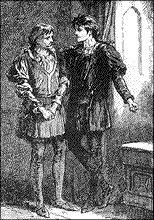![]()
A Special Providence
 |
For Eleanor Prosser, the moment when Hamlet's transformation becomes apparent
occurs in the first part of Act V. Scene II during the conversation with
Horatio that bridges the two sections of the scene. Here, he abandons his
relentless determination to carry out a revenge that is the proper function
of God alone, and resigns himself to God's will. It is only after his trust
in Providence is manifested that Claudius will actually die.
| The point is not that nothing matters to Hamlet anymore; the point is that "the slings and arrows of outrageous fortune," "the thousand natural shocks that flesh is heir to" -- these no longer matter when one's eye is on eternity. Hamlet is now ready to become the willing minister of Heaven. He has put himself at the disposal of God to use as, in His knowledge, He shall see fit. - Eleanor Prosser, Hamlet and Revenge, Stanford Univ. Press. Stanford. 1971. p. 234. |
C.S. Lewis also sees his statement of trust in Providence as a turning point in the drama. As he states: "The world of Hamlet is a world were one has lost one's way. The Prince has no doubt lost his, and we can tell the precise moment at which he finds it again." (C.S.Lewis, "Hamlet, The Prince of the Poem?", p.11.)
The speech to which Prosser and Lewis refer is as follows:
| Not a whit, we defy augury. There is a special providence in the fall of a sparrow. If it be now, 'tis not to come; if it be not to come, it will be now; if it be not now, yet it will come - the readiness is all. Since no man, of aught he leaves, knows what is't to leave betimes, let be. (V.ii.200.) |
The teaching of Christ to which this passage refers is recorded in two similar versions in the Bible.
|
And fear not for them which kill the body, and are not able to kill
the soul: but rather fear him which is able to destroy both soul and
body in hell. And I say unto you my friends, Be not afraid of them that kill the
body, and after that have no more that they can do. |
Harold Bloom's reading of that same speech points out the transformation of a Christian vocabulary through a consciousness which he characterizes as "Dionysian."
|
"Let be" has become Hamlet's refrain, and has a quietistic
force uncanny in its suggestiveness. He will not unpack his heart
with words, since only his thoughts, not their ends, are his own.
And yet there is something far from dead in his heart, something ready
or willing, strong beyond the weakness of flesh. When Jesus spoke
kindly to the sleep-prone Simon Peter, he did not say that the readiness
was all, since Jesus' stance was for Yahweh alone, and only Yahweh,
was all. For Hamlet their is nothing but the readiness, which translates
as a willingness to let everything be, not out of trust in Yahweh
but through a confidence in a final consciousness. |